
An archive of articles on the silent era of world cinema.
Copyright © 1999-2025 by Carl Bennett and the Silent Era Company.
All Rights Reserved.
|
|
When Mary Pickford Came to Me
THE STORY OF THE MAN WHO FIRST WROTE
HER NAME IN LIGHT ON BROADWAY
By David Belasco 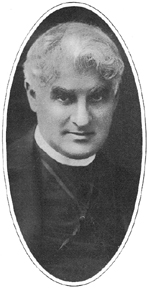 EDITOR’S NOTE: PHOTOPLAY MAGAZINE is indebted to the most famous individual theatrical manager in the world for this simple, intimate account of Miss Pickford’s stellar beginnings in New York. The story appears exactly as Mr. Belasco dictated it. It is one of the few narratives of contemporary theatrical affairs which he has thought worthy of his personal narration. EDITOR’S NOTE: PHOTOPLAY MAGAZINE is indebted to the most famous individual theatrical manager in the world for this simple, intimate account of Miss Pickford’s stellar beginnings in New York. The story appears exactly as Mr. Belasco dictated it. It is one of the few narratives of contemporary theatrical affairs which he has thought worthy of his personal narration.
For a long time I had been receiving a number of letters from a little girl who signed herself Mary Pickford. She said she wanted to get into a bigger dramatic company and play in New York. In one of her letter she told me she had vowed never to appear in New York except under my management. With each of her letters she enclosed a photograph, and they proved particularly interesting, as in nearly every picture there was such variety of facial expression.
When I was casting “The Warrens of Virginia,” by William C. De Mille, I found the child’s part, that of Betty Warren, to be an unusually good one. It needed a little girl with a strong sense of the dramatic and emotional, as well as a little comedienne. My first meeting with Mary Pickford was on the eve of going into rehearsal. The cast was all made up, even to the party of Betty — but I was not altogether satisfied with the girl I had for that role. At the time, Miss Frances Starr was playing “The Rose of the Rancho,” in the old Belasco Theatre, now re-named The Republic. It was a Thursday matinee, and the stage door man came and told me that a child wished to see me. I told him to tell her I couldn’t see anyone. She insisted, so much so, that the man returned with the message that she had come a long distance to see me and had to leave town at noon the next day to resume her tour in some small play. She simply must see me before leaving New York!
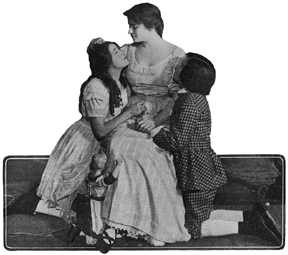 Because of her persistency, and, remembering upon hearing her name, the many letters and photographs she had sent to me, I consented to receive her. Miss Pickford came into my little room off the stage, as sweet and pretty a picture as I had ever seen. She wore short dresses, with her hair down her back, and altogether she looked very charming. Because of her persistency, and, remembering upon hearing her name, the many letters and photographs she had sent to me, I consented to receive her. Miss Pickford came into my little room off the stage, as sweet and pretty a picture as I had ever seen. She wore short dresses, with her hair down her back, and altogether she looked very charming.
“Mr. Belasco, I recognize you by your pictures,” were her first words. “I’m Mary Pickford. Our company is playing near New York just now, and I’ve come to see you. I want to go under your management.” As she had said this, she looked straight at me, her big, beautiful eyes looking straight into mine. Not for a moment did her glance waver.
I saw at once that she was just my ideal for the part of Betty Warren. The more I listened to her the more I realized she was the child I wanted for this role. I asked little Mary her ambitions and she said she wanted to be an emotional actress. She showed me a number of letters making her offers to appear in plays, but she had refused them all. She told me that it had been her dream always to one day play for me.
“I’ve come a long way to see you, Mr. Belasco; please don’t disappoint me. And you will give me a part — you must.” Then her voice choked a bit, but she bravely continued:
“You might as well say you want me now, because I won’t leave New York until you do. Our company is going on a long tour beginning tomorrow, but I am not going with it. I have made up my mind that now is the time for me to realize my dream.”
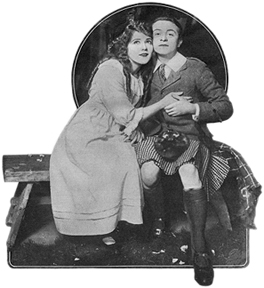 I smiled, and she said: “Am I engaged?” I smiled, and she said: “Am I engaged?”
I answered, “You are.”
“Oh, is this Frances Starr?” ejaculated my little visitor, jumping up from where she had been sitting. “I have heard so much about you. Aren’t you happy to be playing with Mr. Belasco?”
“Yes,” said Miss Starr, smiling upon the eager child.
“I’m happy, too,” said Miss Pickford, with a shake of the head and with much enthusiasm. “I am going to play for Mr. Belasco — isn’t it wonderful!” And Miss Pickford, on whose shoulders there rested even then an unusually strong business head, turned and said to me:
“I’m getting a splendid salary, and you may not want to pay me as much, for I realize that the part you have for me is a small one. But don’t tell me how much; I’ll take whatever you will give me.”
With this, Miss Starr remarked: “I said the same thing to Mr. Belasco when he engaged me, and my first envelope contained much more than I would have asked him.”
And as Miss Starr went to her dressing room to change for the next act, little Mary Pickford threw her arms around me and with tears in her eyes thanked me for engaging her. She went away a living embodiment of enthusiasm and joy.
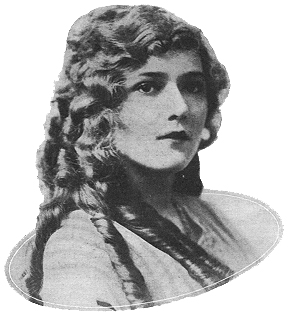 Rehearsing Mary Pickford was a great pleasure. She was a hard worker, the first at rehearsals and the last to go. She would go over and over her little scenes many times. She would read and re-read her lines to find out which was the best way to speak them. When she asked me about them I said to her: “Which do you feel the best?” Then she would tell me, and I would say, “That is the best way.” She always took suggestions quickly, and acted upon them at once. She was very creative and a highly imaginative little body. She would say: Rehearsing Mary Pickford was a great pleasure. She was a hard worker, the first at rehearsals and the last to go. She would go over and over her little scenes many times. She would read and re-read her lines to find out which was the best way to speak them. When she asked me about them I said to her: “Which do you feel the best?” Then she would tell me, and I would say, “That is the best way.” She always took suggestions quickly, and acted upon them at once. She was very creative and a highly imaginative little body. She would say:
“Oh, Mr. David, I thought of something for my part. Will you look at it and let me know what you think about it?” Invariably, she was right, and I always let her do as she suggested. As I noted the little things she did with the part I understood why she made such a success. Her postures were graceful, and it was remarkable how she would visualize a story. Often I would tell he one, and even as I told it she would illustrate it with her ever-changing expressions and delicately subtle movements of body.
Always quiet, she was loved by everyone. Of a retiring nature, she was never in the way of anyone about the theatre, and she helped all who came in contact with her. In addition to being a little student she was unusually inspirational. Therein lies her great success.
On the first night of “The Warrens of Virginia,” little Mary was the most composed of the entire company. This same composure has been one of her greatest assets on the screen. Her features do not become strained. She is all repose — easy and graceful at all times.
Miss Pickford remained with me in “The Warrens of Virginia” for nearly three seasons. She made herself famous in that one part, which was a great personal success for her and contributed very much to the play. This was at the time of the beginning of motion pictures, and Mary Pickford’s remarkable face and personality were noticed by the pioneers in that field. So it was only natural that at the end of the tour of our play she should have gone into picture work. From the first she gave promise of the ability that has since made her the greatest motion picture artiste in the world.
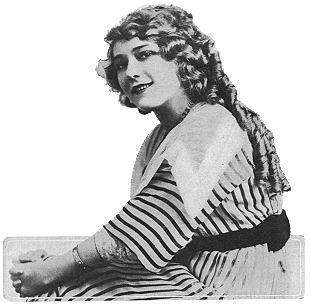 Before she left me, Miss Pickford said: “Mr. Belasco, remember, no matter where I am or what I am doing, when you want me just let me know, and I’ll come.” I did not she her again for a number of years, but I watched her grow in popularity. Then came the time when I wanted to produce a child’s play: “A Good Little Devil,” the delightful fairy drama by Rosemonde Gerard and her son, Maurice Rostand. By this time Mary Pickford was famous, and had become known throughout the land as “The Queen of the Movies,” and was the highest salaried artiste posing for the motion picture camera. No sooner had I read the manuscript for “A Good Little Devil” than I thought of her for the part of the little blind girl, Juliette. I sent for her. She came to me that very day, and I said: Before she left me, Miss Pickford said: “Mr. Belasco, remember, no matter where I am or what I am doing, when you want me just let me know, and I’ll come.” I did not she her again for a number of years, but I watched her grow in popularity. Then came the time when I wanted to produce a child’s play: “A Good Little Devil,” the delightful fairy drama by Rosemonde Gerard and her son, Maurice Rostand. By this time Mary Pickford was famous, and had become known throughout the land as “The Queen of the Movies,” and was the highest salaried artiste posing for the motion picture camera. No sooner had I read the manuscript for “A Good Little Devil” than I thought of her for the part of the little blind girl, Juliette. I sent for her. She came to me that very day, and I said:
“Mary, I have a beautiful part, one that is just suited to you. You will make a great success in it, and it will help in your artistic development.”
“You say the part is very beautiful,” she said. “You know, I promised I would come whenever you wanted me. If you want me now I’ll keep my word.”
“I not only want you — I need you,” was my reply.
Tears came and she asked: “Do you really need me?”
“I certainly do.”
“Then I’ll come back to you.”
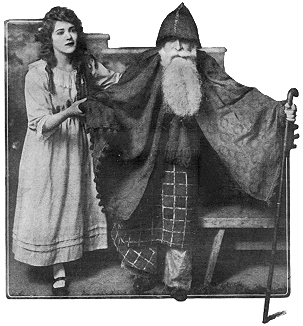 And this wonderful little girl, who holds such a unique position in the annals of our theatre, came back to us all, and played the little blind girl in “A Good Little Devil.” And this wonderful little girl, who holds such a unique position in the annals of our theatre, came back to us all, and played the little blind girl in “A Good Little Devil.”
During the first rehearsal, she came to me and said, “Oh, Mr. David, I’m dressing in the same room that Miss Starr used when I first came to you for an engagement. Isn’t it wonderful? In ‘The Warrens’ I dressed way upstairs. Now I am in this other room!” She made a great artistic success in the part, and her motion picture following swarmed around the doors of the theatres to see her after every performance, particularly at matinees. This kept up for months during the long New York run, and was even more enthusiastic when the company was on tour. In all the places that the play went the motion picture people had camera men waiting and took special pictures of “Little Mary” going to and from the theatre, and leaving the theatre after a performance. Her pictures were shown before and after the arrival of the play, and also while it was running.
Miss Pickford’s success in the difficult role of the little blind girl was phenomenal. Nothing like her remarkable performance of a child’s part ever had been seen in New York or elsewhere, and for a player to jump into such instantaneous popularity was almost unheard of.
During the summer, after the long run of “A Good Little Devil,” Miss Pickford was taken seriously ill, and it became necessary for her to undergo a dangerous operation. For many nights she lingered between life and death.
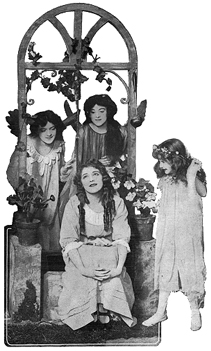 It was after one of my long rehearsal of “The Concert” when Mary’s mother came to me in the Belasco Theatre, and said: It was after one of my long rehearsal of “The Concert” when Mary’s mother came to me in the Belasco Theatre, and said:
“Oh, Mr. Belasco, Mary’s just out of the hospital this morning and insisted upon coming straight over here to see you. We have been out in front all day long, but she wouldn’t allow me to interrupt you.”
I rushed into the dark auditorium to see Mary and found her propped up in a chair, looking just a shadow of her pretty self.
“Why, Mary dear, have you been here all this time? Why didn’t you speak up and let me know?”
“I didn’t want to interrupt you during rehearsal,” she said, in a rather feeble voice, her wonderfully large eyes looking straight at me out of the darkness of the place.
It was near the time for the beginning of the second-year of “A Good Little Devil,” about two months before the opening. I realized at once that it would be impossible for her to travel, and I told her that I would not allow her to risk her life, tour or no tour of the play.
She said, “Mother was going to take me out to Los Angeles to regain my health, but I may be able to come back in time.”
I said, “I do not think you should risk it.”
“Let’s not decide today,” said Mary.
In a few days the Famous Players Film Company made her an offer to take some motion pictures of her while she was out on the Pacific Coast. I told Mary that this would be fine; not only would the picture work keep her occupied, but being out-of-doors it would not be hard on her or too taxing on her strength, and that she would not be losing time and would be receiving splendid remuneration for her services.
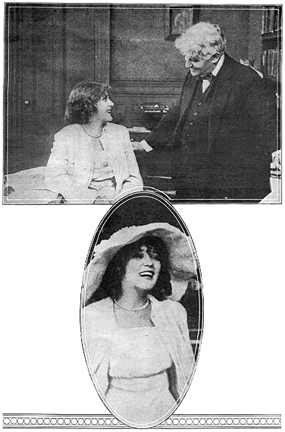 Several days after that, little Mary called to see me, and said: Several days after that, little Mary called to see me, and said:
“I want to tell you, Mr. David, that everything has come out just as you said it would. Playing the little blind girl has helped me more than I can tell you. All of the motion picture managers want me, and I am to state my own terms.”
“I do not think you will be strong enough to go on a long tour,” I told her. “And as I’m sure you are going to be the most famous motion picture player in the world, I do not think that ‘A Good Little Devil’ should stand in your way. I release you. Some time in the future if you should tire of the pictures, and want to come back to the legitimate stage, I will always have a place for you.” And so we parted.
When Mary Pickford came to me her salary was $35.00 per week. In her present line of work she has a guaranteed salary of more than $100,000 a year, with all of her expenses paid, and automobiles and everything that she may want at her command and at no expense to her.
I remember once Mary asked David W. Griffith, who was her first motion picture director, if she could do a picture with me. And one of the things that I value very highly is a reel, the only one which I possess, and which I have in my studio and treasure greatly. We did the picture, along with Mr. Griffith and the late William J. Dean, who was my general stage director at the time.
Whenever Mary Pickford made a new picture I was always invited to come and look at it before it was released to the public. I still receive these invitations and frequently we see each other and exchange greetings. No one takes more pride and pleasure in her success than I. No one knows better than I that it is due, not to mere circumstances, but to the artistry and charm by means of which Mary Pickford has become known in every city, town and hamlet in the land and beloved by all our people. This article originally appeared in Photoplay Magazine, December 1915, Volume IX, Number 1, pages 27-34.
|




































